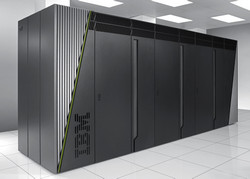Towards super computers: EU project improves energy efficiency in high performance computing
Exascale computers, so-called supercomputers of our future, are machines that would be capable of performing at least 10 trillion operations per second. The work rate at exascale is inconceivably immense, offering the prospect of transformative progress in energy, national security, the environment, and our economy, and fundamental scientific questions. However, the path to exascale involves numerous complex challenges, and one of these is power consumption. The FP7-funded EXA2GREEN project, has taken up this challenge and is developing a radically new energy-aware computing paradigm and programming methodology for exascale computing. Comprising an interdisciplinary research team of High Performance Computing (HPC) experts from Germany, Switzerland and Spain, the EXA2GREEN team focuses on three main activities: first, developing tools for measuring the performance and energy consumption of computations; second, analysing existing, widely used computational kernels and developing new energy-efficient algorithms; and finally, optimising a compute-intensive climate model to achieve a considerable reduction of energy consumption in climate simulations. For this third element, EXA2GREEN is using the COSMO-ART weather forecast model as an example of an intensive simulation, whose energy profile is currently far from optimal. The team is now two-thirds of the way through the project and is making great strides. EXA2GREEN has already developed a tool to analyse the performance and power dissipation of parallel scientific applications. Ultimately this will enable scientists and technicians to identify sources of power inefficiency and to optimise the application code. Team members have also produced accurate models for the characterization and time-power-energy prediction of several elementary computational kernels, and investigated the energy footprint and performance profile of COSMO-ART on various HPC platforms. Prof. Vincent Heuveline, coordinator of EXA2GREEN at the University of Heidelberg, emphasises the importance of collaboration in terms of the project’s achievements. He notes, ‘Our interdisciplinary project consortium comprises partners from the fields of high performance computing (HPC), computer science, mathematics, physics and engineering. The partners contribute with their specific competences in the collaboration to address the research topics.’ However the EXA2GREEN journey so far has not been without challenges, as Prof. Heuveline explains, ‘Current computer architectures in large HPC systems consume enormous amounts of energy. It can be very difficult to inspect and understand all possible power sinks in these platforms. In order to gain insights about the applications' power consumption, we use two types of power measurement devices – external and intermal power meters – and we gather additional information from hardware sensors. By combining these data from different measurements, we gain a detailed view on the power consumption.’ Many developments are planned for the final year of the project. One of the next steps involves exploiting the knowledge acquired during the first phase of the project to develop energy-aware implementations of some of the considered algorithms. The team will also use the power-performance measurement framework to work on an energy evaluation of the COSMO-ART model system and try to apply, wherever possible, energy-aware techniques. EXA2GREEN is confident that their work will make a valuable contribution to improving today’s machines and achieving more energy-efficient exascale computing. Prof. Heuveline notes, ‘Besides the evident intrinsic value of new energy-aware algorithms which are able to solve the same problem consuming less energy, this work is actually extremely important to develop a new holistic vision on energy-aware computing. Our overall goal is not only to make a better use of today's machines, but also to drive the development of future generation hardware and algorithms in the right direction toward the next generation of exascale supercomputers.’ EXA2GREEN is part of the 'FET (Future and Emerging Technologies) Proactive Initiative: Minimising Energy Consumption of Computing to the Limit'. For more information, please visit: http://exa2green-project.eu/
Countries
Germany



